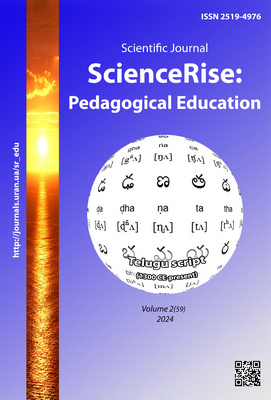Media educational approach to forming information literacy of lyceum students in Ukrainian language lessons
DOI:
https://doi.org/10.15587/2519-4984.2024.304461Keywords:
information literacy, media education approach to learning the Ukrainian language, media education principlesAbstract
The article describes one of the current educational problems - the formation of information literacy of students in the process of learning the Ukrainian language based on the media education approach. The approach to learning was considered as a basic category that determines the further direction of learning the native language and the choice of the method of its implementation in further school practice. The article specifies the definition of "information literacy". The task of media education for the educational process is defined. The importance of using media texts in the educational process was emphasized. The goals, set for information literacy, are indicated. Theoretical research methods were used, which helped to more thoroughly investigate the aspects of the media educational approach to the formation of information literacy of a young language personality. Within the framework of the media education approach, the types of educational works are described. The general trends of modern times in the aspect of development and integrated implementation of the media approach to the subject of school education, which positively affects the content of education, are taken into account. The vector of this research is focused on the works of Ukrainian scientists. The peculiarities of studying the Ukrainian language on the basis of the media education approach are characterized. The principles of the formation of information literacy of students in the process of learning the Ukrainian language are outlined, which can ensure effective interaction of high school students with the modern media system and information resources. A number of works by foreign researchers were analyzed in order to describe how to correctly implement the media education process in Ukrainian language classes. There are several methods that should be used within the media education approach. It is taken into account that the ability to use various technologies and media means in the educational process is a significant advantage and progress in pedagogical activity. The importance of the development of the teachers themselves in the direction of technology is emphasized
References
- Binytska, K. (2014). Dosvid rozvytku mediaosvity v zarubizhnykh krainakh. Zbirnyk naukovykh prats Umanskoho derzhavnoho pedahohichnoho universytetu, 1, 37–44.
- Honcharenko, S. U. (1997). Ukrainsky pedahohichny slovnyk. Kyiv, 373.
- Bondarenko, N. (2020). Reading literacy of Ukrainian pupils: highlights of PISA-2018. Ukrainian Educational Journal, 2, 95–103. https://doi.org/10.32405/2411-1317-2020-2-95-103
- Korytska, H., Bohdziievych, S. (2021). Possibilities of integration of media didactics elements in school language and literary education. Ukrainian Educational Journal, 4, 171–179. https://doi.org/10.32405/2411-1317-2021-4-171-179
- Shevchenko, L., Syzonov, D. (2021). Teoriia medialinhvistyky. Kyiv, 214.
- Bainiashova, S. (2023). Content analysis of the concept of "information literacy". Zhytomyr Ivan Franko state university journal. Рedagogical sciences, 3 (114), 5–15.
- Clark, R. E. (2001). Educational Media. International Encyclopedia of the Social & Behavioral Sciences, 4279–4283. https://doi.org/10.1016/b0-08-043076-7/02335-4
- Kucheruk, O. (2020). Learning ukrainian language on media educationin general education school: socio-cultural aspect. Naukovi pratsi Kamianets-Podilskoho natsionalnoho universytetu imeni Ivana Ohiienka: Filolohichni nauky, 51, 76–80.
- Naydonova, L. A., Sliusarevsky, M. M. (2016). Kontseptsiia vprovadzhennia mediaosvity v Ukraini (nova redaktsiia). Kyiv, 16.
- Kucheruk, O. (2020). Intehruvannia infomediinoi hramotnosti v prostir movnoi osvity. Ukrainska mova i literatura v shkoli, 3, 9–12. Available at: http://eprints.zu.edu.ua/id/eprint/32198 Last accessed: 18.02.2023
- Prykhodkina, N. O. (2019). Mediaosvita yak zasib rozvytku efektyvnoi vzaiemodii uchniv iz suchasnym informatsiynym prostorom. Humanitarnyi korpus, 30, 104–105.
- Halaievska, L. (2018). Formuvannia informatsiinoi kompetentnosti starshoklasnykiv na urokakh ukrainskoi movy. Ukrainska mova i literatura v shkoli, 3, 26–29.
- Holub, N. (2019). Do problemy formuvannia hromadianskoi kompetentnosti v uchniv litseiu na urokakh ukraïnskoï movy. Formuvannia hromadianskoi kultury v noviy ukrainskiy shkoli: tradytsiyni ta innovatsiyni praktyky. Sumy.
- Hryshchenka, M. (Ed.) (2016). Nova ukrainska shkola: kontseptualni zasady reformuvannia serednoi shkoly. MON Ukrainy, 40. Available at: https://repository.ldufk.edu.ua/handle/34606048/20195 Last accessed: 19.12.2023
- Kucheruk, O. A., Mahdych, T. P. (2022). Hromadianska kompetentnist u metodytsi navchannia ukrainskoi movy uchniv starshykh klasiv. Zhytomyr: Vyd-vo PP "Ruta", 148.
- Shunevych, O. M. (2017). Shliakhy formuvannia mediahramotnosti v protsesi navchannia uchniv ukrainskoi movy. Ukrainsky pedahohichny zhurnal, 4, 103–111.
- Grizzle, A., Wilson, C., Tuazon, R., Cheung, C. K., Jesus, L., Fische, R. et al. (2021). Media and information literate citizens: think critically, click wisely! Media and information literacycurriculum for educators and learners. Paris: UNESCO Publishing, 403. Available at: https://unesdoc.unesco.org/ark:/48223/pf0000377068 Last accessed: 19.12.2023
- Pagano, K. O. (2013). Immersive Learning: Designing for Authentic Practice. Storytel. Available at: https://www.storytel.com/in/books/immersive-learning-designing-for-authentic-practice-2149933 Last accessed: 20.12.2023
- Holub, N. B., Horoshkina, O. M. (2019). Kontseptsiia navchannia ukrainskoi movy uchniv starshoi shkoly. Kyiv, 56.
Downloads
Published
How to Cite
Issue
Section
License
Copyright (c) 2024 Svitlana Bainyashova

This work is licensed under a Creative Commons Attribution 4.0 International License.
Our journal abides by the Creative Commons CC BY copyright rights and permissions for open access journals.
Authors, who are published in this journal, agree to the following conditions:
1. The authors reserve the right to authorship of the work and pass the first publication right of this work to the journal under the terms of a Creative Commons CC BY, which allows others to freely distribute the published research with the obligatory reference to the authors of the original work and the first publication of the work in this journal.
2. The authors have the right to conclude separate supplement agreements that relate to non-exclusive work distribution in the form in which it has been published by the journal (for example, to upload the work to the online storage of the journal or publish it as part of a monograph), provided that the reference to the first publication of the work in this journal is included.







